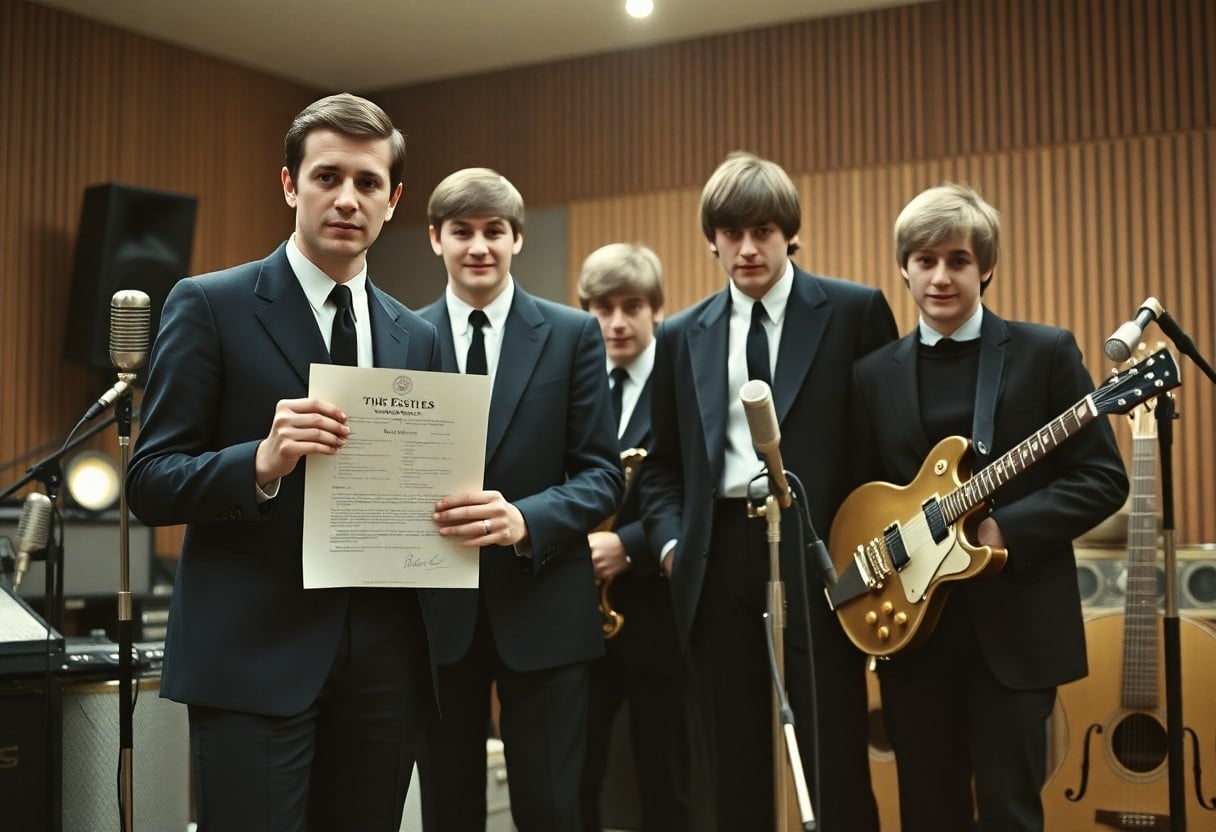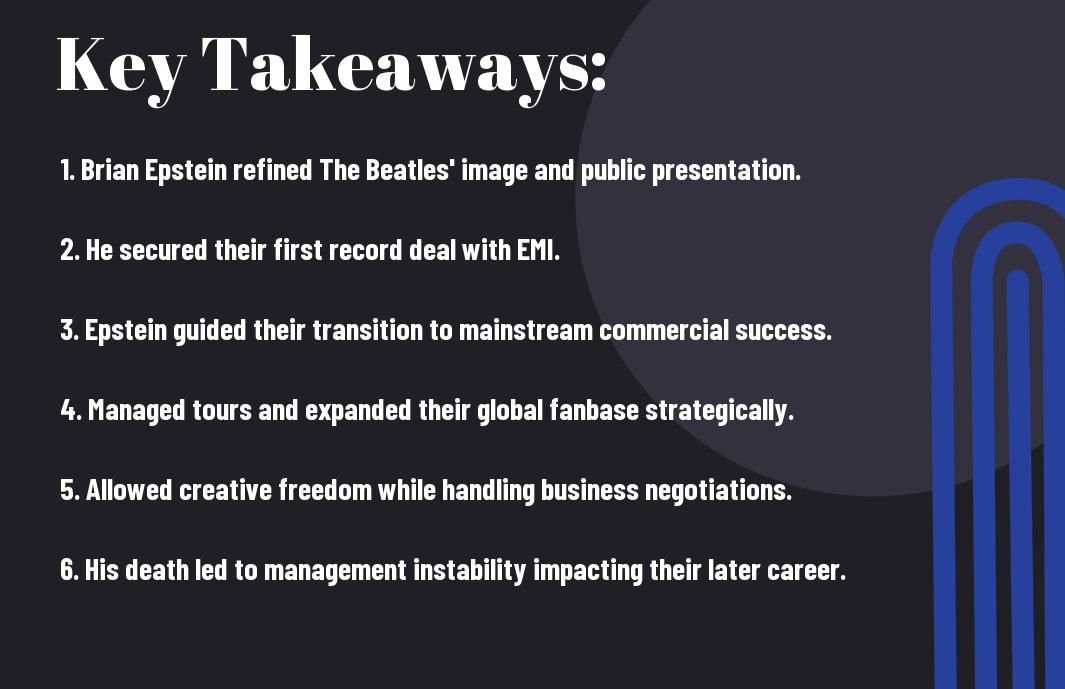Just as the world of music was evolving in the early 1960s, so too were the fortunes of a young band from Liverpool—The Beatles. You may not realize how Brian Epstein’s visionary management played a pivotal role in transforming them from local performers into global icons. His approach not only shaped their image but also directed their artistic choices and business strategies, steering them through both triumphs and challenges. In this post, I will guide you through the profound impacts of Epstein’s management on The Beatles, from their beginnings to their eventual dissolution.
The Early Days: Epstein’s Entry into The Beatles’ World
Your understanding of The Beatles’ legendary status often overlooks the pivotal role of Brian Epstein. When he first encountered the band, they were struggling to gain traction in the music industry. Epstein’s keen business acumen and passion for their music would soon transform their career trajectory, setting the stage for unprecedented success.
The Meeting that Changed Everything
Behind the scenes of Liverpool’s music scene, a serendipitous encounter brought Epstein face to face with The Beatles. This meeting marked a turning point for all involved, reshaping their future and altering the course of popular music history.
Initial Reactions and Decisions
Beside the excitement of their newfound partnership, The Beatles experienced mixed emotions regarding Epstein’s management style. As they considered his proposal, they faced the daunting choice to embrace a more polished image or maintain their raw, rebellious roots.
That initial meeting sparked a whirlwind of decisions for The Beatles. They were understandably wary of shifting their image with Epstein’s polished approach, fearing it could dilute their authenticity. However, they quickly recognized his industry expertise and determination to broaden their reach. The band’s decision to trust Epstein’s vision would lead to carefully crafted stage performances and savvy marketing strategies that would propel them to global fame. That trust laid the foundation for their journey from a local Liverpool band to becoming icons of a generation—the balance between raw talent and commercial viability became a defining aspect of their success.
Shaping the Image: Branding The Beatles
Clearly, Brian Epstein played an instrumental role in shaping The Beatles’ image, transforming them from a local band into a global phenomenon. He understood the importance of branding and carefully curated their public persona, aligning their style, music, and marketing strategies to attract a wider audience and solidify their status in the music industry.
From Leather Jackets to Suits
From the moment Epstein took over, he made a bold decision to replace The Beatles’ iconic leather jackets with tailored suits. This shift not only gave them a polished and professional appearance but also appealed to a broader demographic, elevating their status and changing the public’s perception of rock and roll musicians.
The Role of Publicity and Media
Leather was replaced with media-savvy maneuvers that would elevate The Beatles to superstardom. Epstein demonstrated a keen understanding of how the press could be leveraged to boost their visibility, organizing meticulously planned publicity events and engaging interviews. By ensuring The Beatles always had a positive public image, he paved the way for their unprecedented success.
For instance, the strategic use of media appearances and interviews became vital to The Beatles’ growth. Epstein orchestrated their involvement in television shows, which allowed their music to reach millions overnight. His focus on creating enticing narratives around the band produced a lasting allure, while their relationship with the press was carefully nurtured to maintain a positive public perception, ultimately establishing them as cultural icons and a defining part of the 1960s. This foundation of media engagement set a precedent for many artists that followed.
Expanding Horizons: Touring and Album Production
After the initial success of The Beatles in Liverpool and Hamburg, Brian Epstein propelled them into a whirlwind of touring and album production. His vision not only broadened their appeal across the UK but also laid the groundwork for their global dominance. Through careful planning and strategic management, Epstein turned The Beatles into a cultural phenomenon, showcasing their talent on stages around the world while ensuring they produced innovative music that resonated with audiences everywhere.
Impact on Live Performances
An important aspect of Brian Epstein’s management was how he transformed The Beatles’ live performances. Epstein introduced a more polished image and encouraged a focus on their musicality, allowing the band to deliver electrifying shows that captivated audiences. His emphasis on presentation helped turn their concerts into memorable experiences, propelling their popularity further and establishing a template for future rock performances.
Transition to Studio Work
Transitioning from live performances to studio work marked a significant evolution in The Beatles’ sound. Brian Epstein fostered this shift, encouraging the band to explore new musical territories and creative experimentation. This period allowed them to hone their artistic vision and produce albums that pushed boundaries, solidifying their revolutionary role in the music industry.
Horizons expanded as The Beatles embraced studio work, leading to groundbreaking albums like “Rubber Soul” and “Sgt. Pepper’s Lonely Hearts Club Band”. Under Epstein’s guidance, they moved away from straightforward pop and began experimenting with complex arrangements and innovative sounds. This shift was not without risks, as the band faced pressure from both fans and industry expectations, but it ultimately fostered their identity as artistic pioneers. Epstein’s management helped to cultivate a space where The Beatles could boldly explore their creativity, setting new standards in music production.
Navigating Challenges: Business and Personal Struggles
Despite the Beatles’ overwhelming success, their journey was fraught with challenges. Brian Epstein, as their manager, played a pivotal role in helping them navigate both business challenges and personal struggles. While he helped establish their image and ensured their music reached wide audiences, he also dealt with the pressures that came from being at the forefront of the music industry. Epstein’s ability to manage these complexities was important in maintaining the band’s trajectory during turbulent times.
Financial Management and Deals
Before joining forces with Epstein, the Beatles faced numerous financial uncertainties. His negotiation skills were instrumental in securing profitable contracts that allowed the band to thrive. By establishing their financial footing early on, Epstein provided the stability necessary for the Beatles to focus on their music, ultimately paving the way for long-term success.
Epstein’s Influence on Interpersonal Dynamics
To understand the Beatles’ group dynamics, one must consider Epstein’s influence. His arrival changed the way the band interacted, fostering a sense of unity and professionalism. He helped mitigate tensions, especially during times of personal strain, allowing John, Paul, George, and Ringo to concentrate on their creativity rather than their interpersonal conflicts.
Struggles within the Beatles were often heightened by their intense personalities and differing artistic visions. Epstein’s presence acted as a mediator, promoting communication and collaboration among them. He recognized that their collective success depended on a harmonious working environment and used his understanding of each member’s temperament to facilitate productive relationships. Without his guidance, the band might have succumbed to their personal struggles, possibly altering the trajectory of their legendary career.
The Turning Point: Changes in Direction
Keep in mind that the evolution of The Beatles under Brian Epstein’s management marked a significant turning point. Initially, Epstein streamlined their image and harmonized their sound, aligning them with mainstream pop. However, as the band’s creative ambitions grew, the pressure of commercial success led to a divergence in artistic vision, challenging the dynamics of their collaboration and ultimately steering them towards a more experimental phase.
Shifting Priorities and Creative Differences
Along this journey, the shifting priorities among the band members became apparent. As The Beatles transitioned from pop sensations to innovative artists, their creative differences emerged, leading to tensions. John Lennon and Paul McCartney sought more autonomy in their songwriting, while George Harrison craved deeper exploration of spiritual themes. These divergences significantly impacted their collaborative efforts.
The Consequences of Artistic Freedom
Freedom in their artistic expression had profound implications for The Beatles. For instance, as they embraced innovative styles in albums like Revolver and Sgt. Pepper’s Lonely Hearts Club Band, they experienced unparalleled creative growth. This transition fostered experimentation but also introduced risks, leading to internal conflicts and strained relationships. The band’s newfound independence ultimately showcased their artistic range but resulted in a fracture within the group. Ultimately, while the pursuit of creativity was liberating, the discord it created illustrated the delicate balance between artistic vision and collaborative harmony.
Final Words
Now that we’ve explored the impact of Brian Epstein’s management on The Beatles, it’s clear that his influence shaped not only their early success but also their evolution as artists. I believe his vision and keen understanding of the music industry played a significant role in fostering their creativity and public image. You can see how his strategic decisions allowed them to reach unprecedented heights, and ultimately, his legacy remains intertwined with their journey, reminding us of the power of effective mentorship in any endeavor.












